Nursing Practice Knowledge and Care: Analyzing Key Body Systems
VerifiedAdded on 2023/06/10
|6
|1715
|458
Homework Assignment
AI Summary
This nursing assignment solution delves into the intricacies of the endocrine, renal, and respiratory systems. It identifies and describes the function of four key hormones produced or released by the pituitary gland, comparing and contrasting the concepts of up-regulation and down-regulation within the endocrine system. The role of the kidneys and associated hormones in maintaining fluid balance in healthy adults is thoroughly discussed, highlighting the functions of antidiuretic hormone (ADH), aldosterone, and atrial natriuretic peptide. Finally, the assignment examines the structure of the respiratory system, detailing the defense mechanisms against infection, including the roles of goblet cells, respiratory reflexes, antibodies, neutrophils, and alveolar macrophages in protecting the lungs.
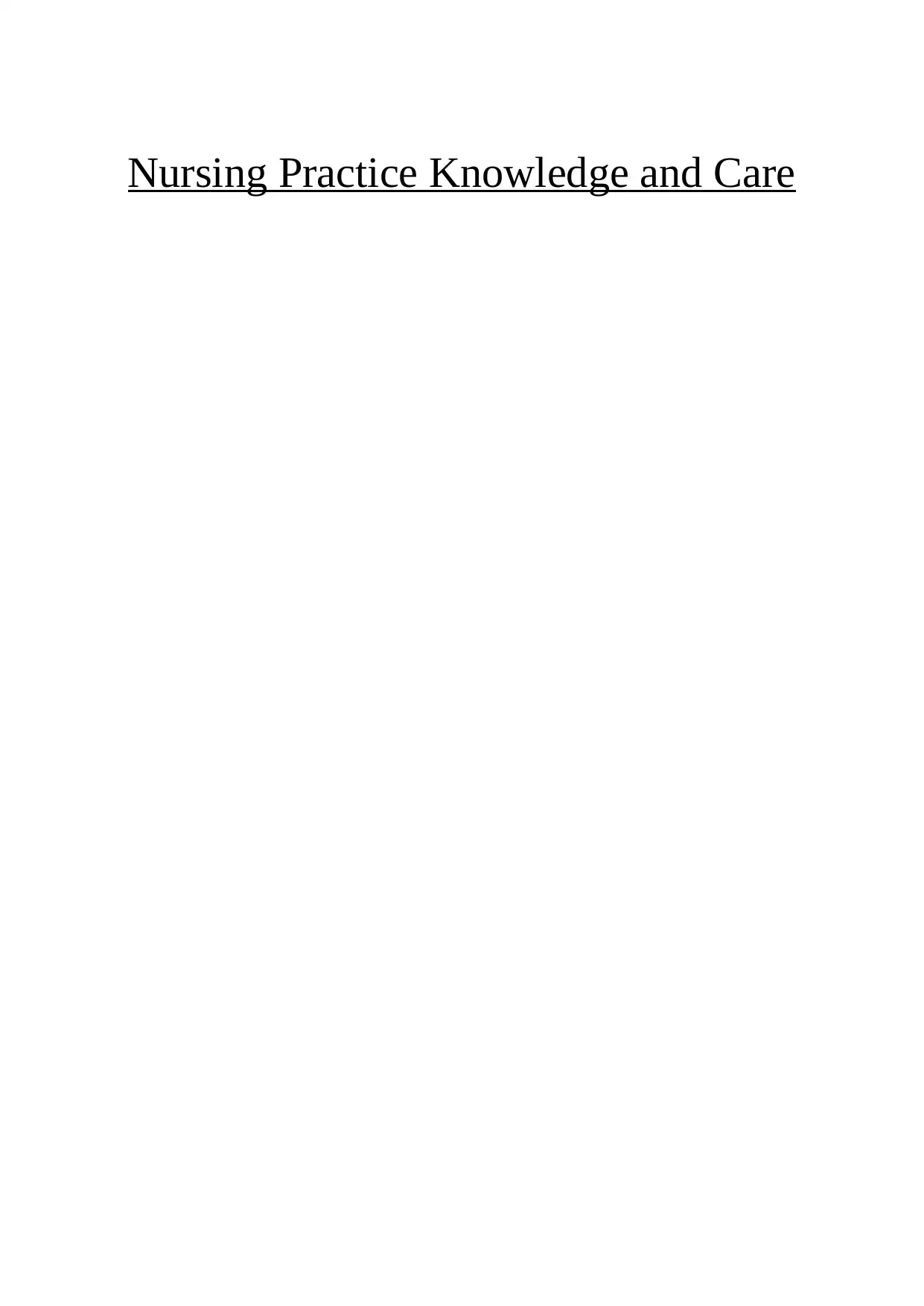
Nursing Practice Knowledge and Care
Paraphrase This Document
Need a fresh take? Get an instant paraphrase of this document with our AI Paraphraser
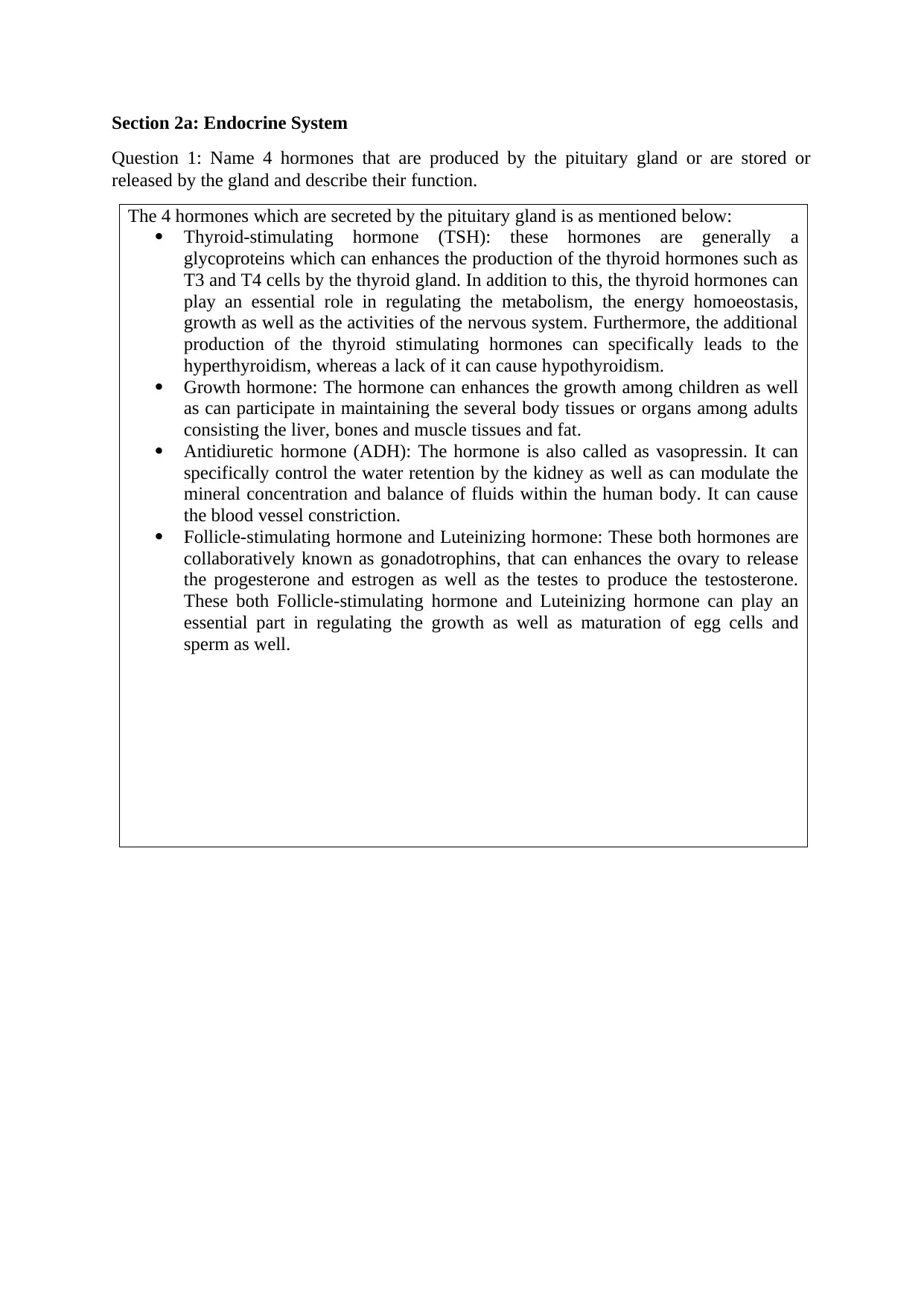
Section 2a: Endocrine System
Question 1: Name 4 hormones that are produced by the pituitary gland or are stored or
released by the gland and describe their function.
The 4 hormones which are secreted by the pituitary gland is as mentioned below:
Thyroid-stimulating hormone (TSH): these hormones are generally a
glycoproteins which can enhances the production of the thyroid hormones such as
T3 and T4 cells by the thyroid gland. In addition to this, the thyroid hormones can
play an essential role in regulating the metabolism, the energy homoeostasis,
growth as well as the activities of the nervous system. Furthermore, the additional
production of the thyroid stimulating hormones can specifically leads to the
hyperthyroidism, whereas a lack of it can cause hypothyroidism.
Growth hormone: The hormone can enhances the growth among children as well
as can participate in maintaining the several body tissues or organs among adults
consisting the liver, bones and muscle tissues and fat.
Antidiuretic hormone (ADH): The hormone is also called as vasopressin. It can
specifically control the water retention by the kidney as well as can modulate the
mineral concentration and balance of fluids within the human body. It can cause
the blood vessel constriction.
Follicle-stimulating hormone and Luteinizing hormone: These both hormones are
collaboratively known as gonadotrophins, that can enhances the ovary to release
the progesterone and estrogen as well as the testes to produce the testosterone.
These both Follicle-stimulating hormone and Luteinizing hormone can play an
essential part in regulating the growth as well as maturation of egg cells and
sperm as well.
Question 1: Name 4 hormones that are produced by the pituitary gland or are stored or
released by the gland and describe their function.
The 4 hormones which are secreted by the pituitary gland is as mentioned below:
Thyroid-stimulating hormone (TSH): these hormones are generally a
glycoproteins which can enhances the production of the thyroid hormones such as
T3 and T4 cells by the thyroid gland. In addition to this, the thyroid hormones can
play an essential role in regulating the metabolism, the energy homoeostasis,
growth as well as the activities of the nervous system. Furthermore, the additional
production of the thyroid stimulating hormones can specifically leads to the
hyperthyroidism, whereas a lack of it can cause hypothyroidism.
Growth hormone: The hormone can enhances the growth among children as well
as can participate in maintaining the several body tissues or organs among adults
consisting the liver, bones and muscle tissues and fat.
Antidiuretic hormone (ADH): The hormone is also called as vasopressin. It can
specifically control the water retention by the kidney as well as can modulate the
mineral concentration and balance of fluids within the human body. It can cause
the blood vessel constriction.
Follicle-stimulating hormone and Luteinizing hormone: These both hormones are
collaboratively known as gonadotrophins, that can enhances the ovary to release
the progesterone and estrogen as well as the testes to produce the testosterone.
These both Follicle-stimulating hormone and Luteinizing hormone can play an
essential part in regulating the growth as well as maturation of egg cells and
sperm as well.
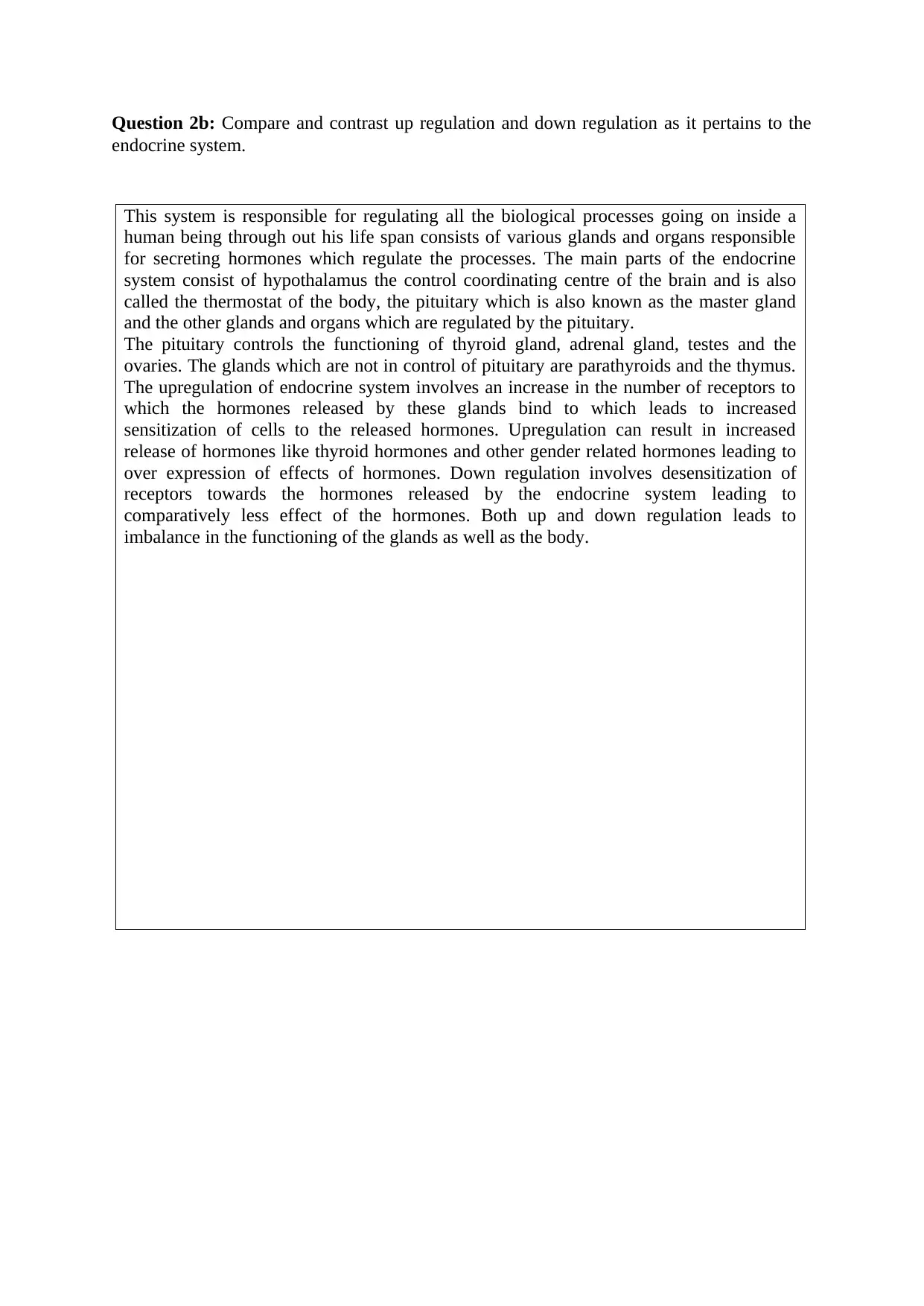
Question 2b: Compare and contrast up regulation and down regulation as it pertains to the
endocrine system.
This system is responsible for regulating all the biological processes going on inside a
human being through out his life span consists of various glands and organs responsible
for secreting hormones which regulate the processes. The main parts of the endocrine
system consist of hypothalamus the control coordinating centre of the brain and is also
called the thermostat of the body, the pituitary which is also known as the master gland
and the other glands and organs which are regulated by the pituitary.
The pituitary controls the functioning of thyroid gland, adrenal gland, testes and the
ovaries. The glands which are not in control of pituitary are parathyroids and the thymus.
The upregulation of endocrine system involves an increase in the number of receptors to
which the hormones released by these glands bind to which leads to increased
sensitization of cells to the released hormones. Upregulation can result in increased
release of hormones like thyroid hormones and other gender related hormones leading to
over expression of effects of hormones. Down regulation involves desensitization of
receptors towards the hormones released by the endocrine system leading to
comparatively less effect of the hormones. Both up and down regulation leads to
imbalance in the functioning of the glands as well as the body.
endocrine system.
This system is responsible for regulating all the biological processes going on inside a
human being through out his life span consists of various glands and organs responsible
for secreting hormones which regulate the processes. The main parts of the endocrine
system consist of hypothalamus the control coordinating centre of the brain and is also
called the thermostat of the body, the pituitary which is also known as the master gland
and the other glands and organs which are regulated by the pituitary.
The pituitary controls the functioning of thyroid gland, adrenal gland, testes and the
ovaries. The glands which are not in control of pituitary are parathyroids and the thymus.
The upregulation of endocrine system involves an increase in the number of receptors to
which the hormones released by these glands bind to which leads to increased
sensitization of cells to the released hormones. Upregulation can result in increased
release of hormones like thyroid hormones and other gender related hormones leading to
over expression of effects of hormones. Down regulation involves desensitization of
receptors towards the hormones released by the endocrine system leading to
comparatively less effect of the hormones. Both up and down regulation leads to
imbalance in the functioning of the glands as well as the body.
⊘ This is a preview!⊘
Do you want full access?
Subscribe today to unlock all pages.

Trusted by 1+ million students worldwide
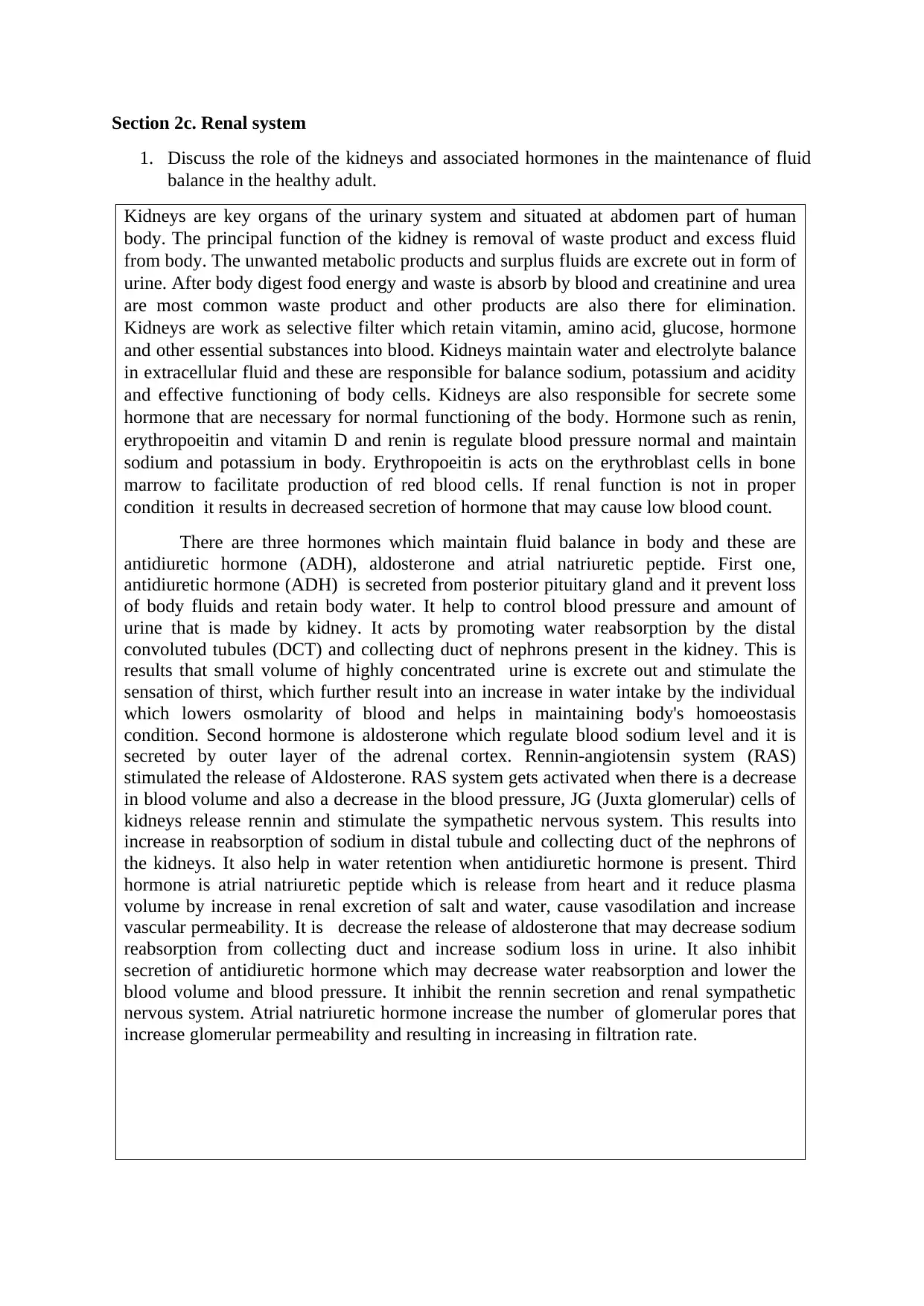
Section 2c. Renal system
1. Discuss the role of the kidneys and associated hormones in the maintenance of fluid
balance in the healthy adult.
Kidneys are key organs of the urinary system and situated at abdomen part of human
body. The principal function of the kidney is removal of waste product and excess fluid
from body. The unwanted metabolic products and surplus fluids are excrete out in form of
urine. After body digest food energy and waste is absorb by blood and creatinine and urea
are most common waste product and other products are also there for elimination.
Kidneys are work as selective filter which retain vitamin, amino acid, glucose, hormone
and other essential substances into blood. Kidneys maintain water and electrolyte balance
in extracellular fluid and these are responsible for balance sodium, potassium and acidity
and effective functioning of body cells. Kidneys are also responsible for secrete some
hormone that are necessary for normal functioning of the body. Hormone such as renin,
erythropoeitin and vitamin D and renin is regulate blood pressure normal and maintain
sodium and potassium in body. Erythropoeitin is acts on the erythroblast cells in bone
marrow to facilitate production of red blood cells. If renal function is not in proper
condition it results in decreased secretion of hormone that may cause low blood count.
There are three hormones which maintain fluid balance in body and these are
antidiuretic hormone (ADH), aldosterone and atrial natriuretic peptide. First one,
antidiuretic hormone (ADH) is secreted from posterior pituitary gland and it prevent loss
of body fluids and retain body water. It help to control blood pressure and amount of
urine that is made by kidney. It acts by promoting water reabsorption by the distal
convoluted tubules (DCT) and collecting duct of nephrons present in the kidney. This is
results that small volume of highly concentrated urine is excrete out and stimulate the
sensation of thirst, which further result into an increase in water intake by the individual
which lowers osmolarity of blood and helps in maintaining body's homoeostasis
condition. Second hormone is aldosterone which regulate blood sodium level and it is
secreted by outer layer of the adrenal cortex. Rennin-angiotensin system (RAS)
stimulated the release of Aldosterone. RAS system gets activated when there is a decrease
in blood volume and also a decrease in the blood pressure, JG (Juxta glomerular) cells of
kidneys release rennin and stimulate the sympathetic nervous system. This results into
increase in reabsorption of sodium in distal tubule and collecting duct of the nephrons of
the kidneys. It also help in water retention when antidiuretic hormone is present. Third
hormone is atrial natriuretic peptide which is release from heart and it reduce plasma
volume by increase in renal excretion of salt and water, cause vasodilation and increase
vascular permeability. It is decrease the release of aldosterone that may decrease sodium
reabsorption from collecting duct and increase sodium loss in urine. It also inhibit
secretion of antidiuretic hormone which may decrease water reabsorption and lower the
blood volume and blood pressure. It inhibit the rennin secretion and renal sympathetic
nervous system. Atrial natriuretic hormone increase the number of glomerular pores that
increase glomerular permeability and resulting in increasing in filtration rate.
1. Discuss the role of the kidneys and associated hormones in the maintenance of fluid
balance in the healthy adult.
Kidneys are key organs of the urinary system and situated at abdomen part of human
body. The principal function of the kidney is removal of waste product and excess fluid
from body. The unwanted metabolic products and surplus fluids are excrete out in form of
urine. After body digest food energy and waste is absorb by blood and creatinine and urea
are most common waste product and other products are also there for elimination.
Kidneys are work as selective filter which retain vitamin, amino acid, glucose, hormone
and other essential substances into blood. Kidneys maintain water and electrolyte balance
in extracellular fluid and these are responsible for balance sodium, potassium and acidity
and effective functioning of body cells. Kidneys are also responsible for secrete some
hormone that are necessary for normal functioning of the body. Hormone such as renin,
erythropoeitin and vitamin D and renin is regulate blood pressure normal and maintain
sodium and potassium in body. Erythropoeitin is acts on the erythroblast cells in bone
marrow to facilitate production of red blood cells. If renal function is not in proper
condition it results in decreased secretion of hormone that may cause low blood count.
There are three hormones which maintain fluid balance in body and these are
antidiuretic hormone (ADH), aldosterone and atrial natriuretic peptide. First one,
antidiuretic hormone (ADH) is secreted from posterior pituitary gland and it prevent loss
of body fluids and retain body water. It help to control blood pressure and amount of
urine that is made by kidney. It acts by promoting water reabsorption by the distal
convoluted tubules (DCT) and collecting duct of nephrons present in the kidney. This is
results that small volume of highly concentrated urine is excrete out and stimulate the
sensation of thirst, which further result into an increase in water intake by the individual
which lowers osmolarity of blood and helps in maintaining body's homoeostasis
condition. Second hormone is aldosterone which regulate blood sodium level and it is
secreted by outer layer of the adrenal cortex. Rennin-angiotensin system (RAS)
stimulated the release of Aldosterone. RAS system gets activated when there is a decrease
in blood volume and also a decrease in the blood pressure, JG (Juxta glomerular) cells of
kidneys release rennin and stimulate the sympathetic nervous system. This results into
increase in reabsorption of sodium in distal tubule and collecting duct of the nephrons of
the kidneys. It also help in water retention when antidiuretic hormone is present. Third
hormone is atrial natriuretic peptide which is release from heart and it reduce plasma
volume by increase in renal excretion of salt and water, cause vasodilation and increase
vascular permeability. It is decrease the release of aldosterone that may decrease sodium
reabsorption from collecting duct and increase sodium loss in urine. It also inhibit
secretion of antidiuretic hormone which may decrease water reabsorption and lower the
blood volume and blood pressure. It inhibit the rennin secretion and renal sympathetic
nervous system. Atrial natriuretic hormone increase the number of glomerular pores that
increase glomerular permeability and resulting in increasing in filtration rate.
Paraphrase This Document
Need a fresh take? Get an instant paraphrase of this document with our AI Paraphraser
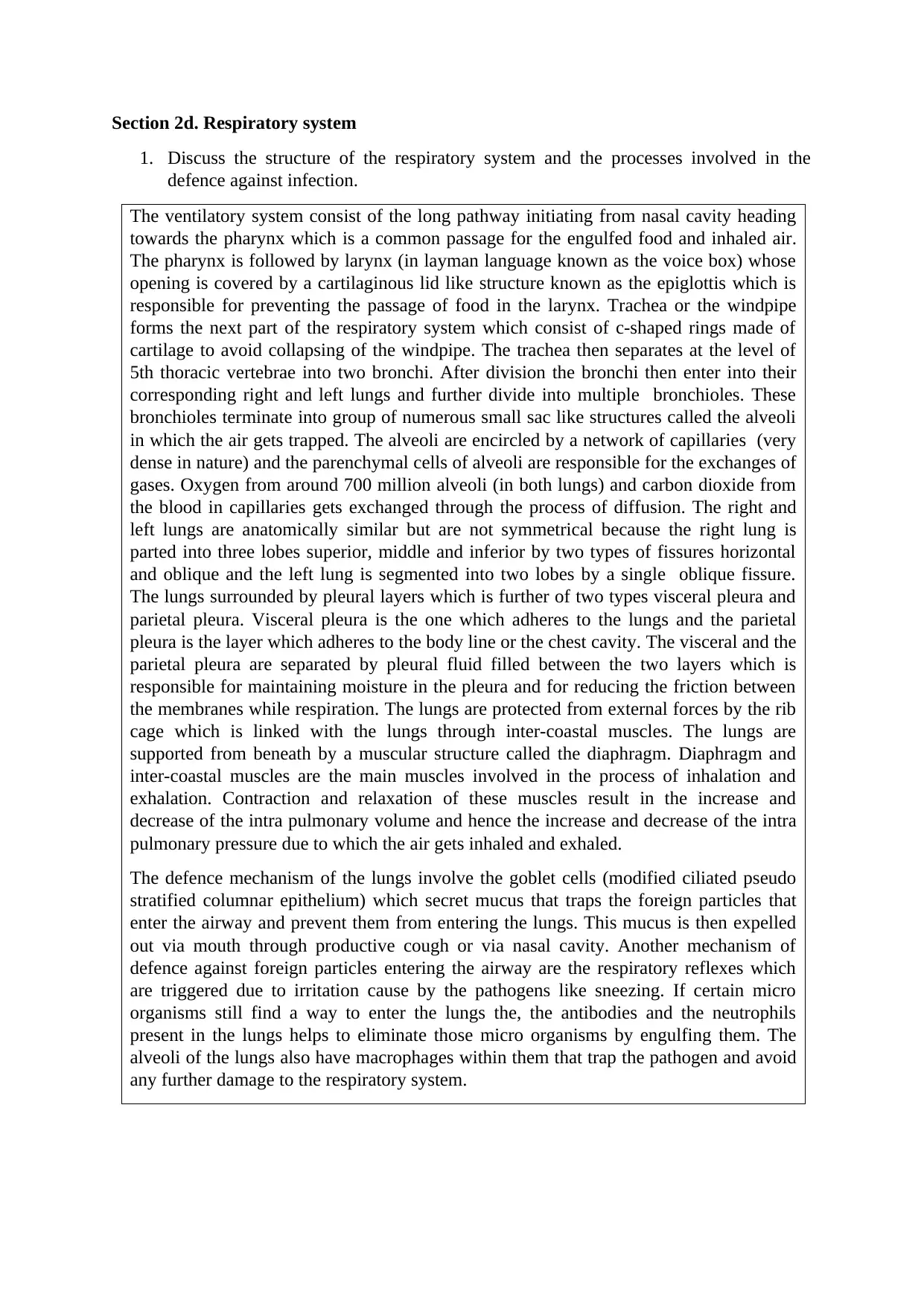
Section 2d. Respiratory system
1. Discuss the structure of the respiratory system and the processes involved in the
defence against infection.
The ventilatory system consist of the long pathway initiating from nasal cavity heading
towards the pharynx which is a common passage for the engulfed food and inhaled air.
The pharynx is followed by larynx (in layman language known as the voice box) whose
opening is covered by a cartilaginous lid like structure known as the epiglottis which is
responsible for preventing the passage of food in the larynx. Trachea or the windpipe
forms the next part of the respiratory system which consist of c-shaped rings made of
cartilage to avoid collapsing of the windpipe. The trachea then separates at the level of
5th thoracic vertebrae into two bronchi. After division the bronchi then enter into their
corresponding right and left lungs and further divide into multiple bronchioles. These
bronchioles terminate into group of numerous small sac like structures called the alveoli
in which the air gets trapped. The alveoli are encircled by a network of capillaries (very
dense in nature) and the parenchymal cells of alveoli are responsible for the exchanges of
gases. Oxygen from around 700 million alveoli (in both lungs) and carbon dioxide from
the blood in capillaries gets exchanged through the process of diffusion. The right and
left lungs are anatomically similar but are not symmetrical because the right lung is
parted into three lobes superior, middle and inferior by two types of fissures horizontal
and oblique and the left lung is segmented into two lobes by a single oblique fissure.
The lungs surrounded by pleural layers which is further of two types visceral pleura and
parietal pleura. Visceral pleura is the one which adheres to the lungs and the parietal
pleura is the layer which adheres to the body line or the chest cavity. The visceral and the
parietal pleura are separated by pleural fluid filled between the two layers which is
responsible for maintaining moisture in the pleura and for reducing the friction between
the membranes while respiration. The lungs are protected from external forces by the rib
cage which is linked with the lungs through inter-coastal muscles. The lungs are
supported from beneath by a muscular structure called the diaphragm. Diaphragm and
inter-coastal muscles are the main muscles involved in the process of inhalation and
exhalation. Contraction and relaxation of these muscles result in the increase and
decrease of the intra pulmonary volume and hence the increase and decrease of the intra
pulmonary pressure due to which the air gets inhaled and exhaled.
The defence mechanism of the lungs involve the goblet cells (modified ciliated pseudo
stratified columnar epithelium) which secret mucus that traps the foreign particles that
enter the airway and prevent them from entering the lungs. This mucus is then expelled
out via mouth through productive cough or via nasal cavity. Another mechanism of
defence against foreign particles entering the airway are the respiratory reflexes which
are triggered due to irritation cause by the pathogens like sneezing. If certain micro
organisms still find a way to enter the lungs the, the antibodies and the neutrophils
present in the lungs helps to eliminate those micro organisms by engulfing them. The
alveoli of the lungs also have macrophages within them that trap the pathogen and avoid
any further damage to the respiratory system.
1. Discuss the structure of the respiratory system and the processes involved in the
defence against infection.
The ventilatory system consist of the long pathway initiating from nasal cavity heading
towards the pharynx which is a common passage for the engulfed food and inhaled air.
The pharynx is followed by larynx (in layman language known as the voice box) whose
opening is covered by a cartilaginous lid like structure known as the epiglottis which is
responsible for preventing the passage of food in the larynx. Trachea or the windpipe
forms the next part of the respiratory system which consist of c-shaped rings made of
cartilage to avoid collapsing of the windpipe. The trachea then separates at the level of
5th thoracic vertebrae into two bronchi. After division the bronchi then enter into their
corresponding right and left lungs and further divide into multiple bronchioles. These
bronchioles terminate into group of numerous small sac like structures called the alveoli
in which the air gets trapped. The alveoli are encircled by a network of capillaries (very
dense in nature) and the parenchymal cells of alveoli are responsible for the exchanges of
gases. Oxygen from around 700 million alveoli (in both lungs) and carbon dioxide from
the blood in capillaries gets exchanged through the process of diffusion. The right and
left lungs are anatomically similar but are not symmetrical because the right lung is
parted into three lobes superior, middle and inferior by two types of fissures horizontal
and oblique and the left lung is segmented into two lobes by a single oblique fissure.
The lungs surrounded by pleural layers which is further of two types visceral pleura and
parietal pleura. Visceral pleura is the one which adheres to the lungs and the parietal
pleura is the layer which adheres to the body line or the chest cavity. The visceral and the
parietal pleura are separated by pleural fluid filled between the two layers which is
responsible for maintaining moisture in the pleura and for reducing the friction between
the membranes while respiration. The lungs are protected from external forces by the rib
cage which is linked with the lungs through inter-coastal muscles. The lungs are
supported from beneath by a muscular structure called the diaphragm. Diaphragm and
inter-coastal muscles are the main muscles involved in the process of inhalation and
exhalation. Contraction and relaxation of these muscles result in the increase and
decrease of the intra pulmonary volume and hence the increase and decrease of the intra
pulmonary pressure due to which the air gets inhaled and exhaled.
The defence mechanism of the lungs involve the goblet cells (modified ciliated pseudo
stratified columnar epithelium) which secret mucus that traps the foreign particles that
enter the airway and prevent them from entering the lungs. This mucus is then expelled
out via mouth through productive cough or via nasal cavity. Another mechanism of
defence against foreign particles entering the airway are the respiratory reflexes which
are triggered due to irritation cause by the pathogens like sneezing. If certain micro
organisms still find a way to enter the lungs the, the antibodies and the neutrophils
present in the lungs helps to eliminate those micro organisms by engulfing them. The
alveoli of the lungs also have macrophages within them that trap the pathogen and avoid
any further damage to the respiratory system.

⊘ This is a preview!⊘
Do you want full access?
Subscribe today to unlock all pages.

Trusted by 1+ million students worldwide
1 out of 6
Related Documents
Your All-in-One AI-Powered Toolkit for Academic Success.
+13062052269
info@desklib.com
Available 24*7 on WhatsApp / Email
![[object Object]](/_next/static/media/star-bottom.7253800d.svg)
Unlock your academic potential
Copyright © 2020–2026 A2Z Services. All Rights Reserved. Developed and managed by ZUCOL.




